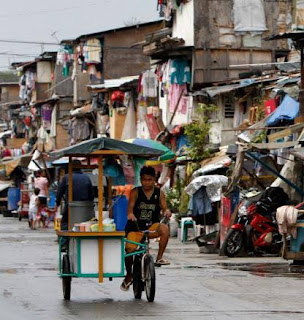Democracy, Poverty and Human Development
Development, according to Amartya
Sen, “can be seen as the process of expanding the real freedoms that people
enjoy.” As a matter of principle, it has been argued that democracy is firmly rooted
in the way it empowers ordinary citizens to achieve the kind of life that is
worthy of their dignity as persons. Sen believes that the just and equitable
approach to human progress must be anchored on the capabilities of people. The fundamental
freedoms of individuals are intrinsically and instrumentally important for them
to be able to choose those things that they have a reason to value.
Arguably, if our country needs to improve its living standards, then power must be diverted from the center toward the peripheries. But the poor themselves do not have the means to do so. If we examine the national statistics, 52% or 11.3 million households belong to the poor or the lower income class. But they only have a 23% share of the country’s wealth. Around 45% constitute the lower up to the upper middle classes, who share 65% of the country’s wealth. Filipinos who belong to the middle class are in Metro Manila and in Central Luzon’s industrial zones, while the poorest are concentrated in the Bicol region, in Western and Central Visayas, and in Mindanao.
If power is the essence of
the political apparatus, then it is important that those who belong to the
middle class should possess the will to serve the ends of democracy. Sen argues
that human development depends on those elements such as economic and social infrastructures,
as well as the protection of the people’s political and civil rights. While equality
cannot be evaluated solely in terms of the income space, it should be pointed
out that the lack of resources undeniably hinders the ability of the poor to pursue
and achieve human well-being.
Democracy is grounded in just and
fair procedures. Ordinary people must be involved in the process of political deliberation.
The freedom to voice out dissent in public discussions gives citizens the chance
to demand from their government those entitlements that they have been deprived
of. Yet, human poverty has an impact on the desire of any person, as suggested
by Adam Smith, “to appear in public without shame.” Even then, know that markets also favor the interest of the wealthy who all manipulate the system.
Democracy is not just about empowering the poor. Elitism undermine the situation of the powerless. The middle class need to make a stake in the country's future. They have to go beyond their gated communities and enjoin themselves in political activism. This is the role of civil society. Change also involves moral persuasion. Those who are at the top of the country’s political and economic hierarchy must embody some sense of moral decency if we, as a people, are to transform and make Philippine society truly just.
Thomas Pogge argues that global structures cause poverty. Historically, slavery has resulted in people's lost of identity. To end poverty, the global rich must rectify years of injustices. It is for this reason the the capability approach must be globalized through policies and agreements. Individuals can achieve things for personal growth and even communal development, but at a global level, addressing poverty will require the dismantling of unjust structures.



